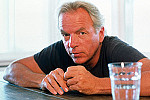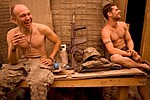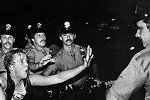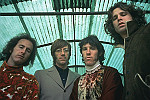 Shadows off the beaten path
Shadows off the beaten pathTHE STONEWALL UPRISING | WHEN YOU'RE STRANGE
< < D O C S > >
last update 4. Jul.10
See also: SHADOWS FILM FESTIVAL
 R E V I E W B Y R I C H C L I N E
R E V I E W B Y R I C H C L I N E
prd Joshua Blum, Amy Hobby, Kathie Russo
with Spalding Gray, Rockwell Gray, Forrest Gray
 release US Jan.10 slam,
release US Jan.10 slam, UK Jun.10 eiff
10/US 1h29

 The late Spalding Gray is the subject of this conceptual documentary, which cleverly uses the actor-performer's own biographical monologues to tell his life story. It's so well-assembled that we really feel like we get to know him in the process.
The late Spalding Gray is the subject of this conceptual documentary, which cleverly uses the actor-performer's own biographical monologues to tell his life story. It's so well-assembled that we really feel like we get to know him in the process.
In addition to performances in a wide range of mostly independent movies, Gray made his name as a comic whose routines consisted mainly of hilariously narrated anecdotes from his life. Here, these monologues are edited into chronological order to tell his story as he himself remembered it. The source material comes from his entire lifespan, from early routines to much later interviews. And a few themes emerge: most prominent are memories of his mentally unstable mother, who had two nervous breakdowns, one of which ended in her suicide.
Mental issues are an important part of Gray's work, as he explores the power of memory and perception. So Gray talks frankly about how his father Rockwell (who also appears in interviews) taught him about sex, as well as the powerful impact of the birth of his son Forrest (who appears in home movies and scored the film), which he calls a "glorious accident". Through all of this, he notes that "this is what I remember", making the point that memory often isn't very reliable. The title refers to a repeated line in an early monologue about his chaotic homelife as a child, as imperfections were sidelined to maintain the illusion of perfection. Suicide is a major theme (although the film never notes that he took his own life in 2004), but his matter-of-fact, often jaggedly funny approach keeps this from being depressing. And there are revealing glimpses of how much he loved life in discussions of his relationships and children.
Gray called his life's work "poetic journalism", telling stories after filtering them in his mind and weaving in both hyperbole and his own imagination. And Soderbergh's assembly of this material is nothing short of masterful. The varied collage, mixing clips from over a long span of time, gives us a remarkable view of all ages of the man, while Gray's own words let us into his experiences, thoughts and feelings. It's a remarkable record of a remarkable life.
17.Jun.10 eiff
 R E V I E W B Y R I C H C L I N E
R E V I E W B Y R I C H C L I N E MUST
MUST  SEE
SEE
with Dan Kearney, Kevin Rice, LaMonta Caldwell, Brendan O'Byrne, Kyle Steiner, Misha Pemble, Aron Hijar, Miguel Cortez, Mark Patterson, Joshua McDonough, Tanner Sticher, Sterling Jones
 release UK Jun.10 eiff,
release UK Jun.10 eiff, US 2.Jul.10
10/US 1h33
SUNDANCE FILM FEST

 Perhaps no movie has ever put us into the place of a soldier quite as effectively as this documentary about Americans in Afghanistan. It's raw and harrowing, and also surprisingly funny. And it makes Hollywood war movies look ridiculous.
Perhaps no movie has ever put us into the place of a soldier quite as effectively as this documentary about Americans in Afghanistan. It's raw and harrowing, and also surprisingly funny. And it makes Hollywood war movies look ridiculous.
Filmmakers Hetherington and Junger embedded themselves with US troops in the perilous Korengal Valley over a 15-month deployment. Much of the intimate footage is shot from cameras mounted on the soldiers' helmets, taking us right into the heat of the battle. We not only experience the terror of the unknown and unexpected, but also the down time with scenes of relaxation, camaraderie and hijinks. All of this centres around Outpost Restrepo, named after a young colleague killed in the early days of their mission.
The filmmakers truly get under the skin of these young men as they have experiences that are impossible to imagine. We can see similarities with war movies in the surprise ambushes, invisible sniper attacks and a harrowing operation that goes nightmarishly wrong. But everything here has the jagged energy of real life peril. When they arrive, we can see that these boys think they will be able to make a real difference, tightening security so they aren't constantly shot at and negotiating with the local village leaders. But of course actual events aren't so controllable.
Much of the film consists of shaky helmet-cams, messy footage that captures both the lively banter and overpowering emotions. This is offset by the striking footage shot by the filmmakers on site, as well as reflective interviews with the soldiers after their tour of duty ends. Combining these elements with the constant pop-pop of unseen guns is thoroughly unnerving. And watching these guys on patrol looks more like an old WWII movie than something from the 21st century: establishing positions, inching forward, engaging in constant gun battles.
And then there are the scenes with them playing guitar, reading surfing magazines and sharing photos from home. These more playful moments capture the high these guys feel after surviving each attack. And yet in their interviews we can see that the darkness remains. This is a vitally important film that captures the real distress of battle in a way most of us have never seen before.
23.Jun.10 eiff
 R E V I E W B Y R I C H C L I N E
R E V I E W B Y R I C H C L I N E
scr David Heilbroner

release UK Mar.10 llgff,
US 18.Jun.10
10/US 1h21

 This sensitive and important documentary, based mainly on personal accounts, explores the fateful day when the gay community finally stood up to police and cultural oppression. The build-up to the clash in 1969 is outlined in telling detail, as people tell their stories with emotion and honesty.
This sensitive and important documentary, based mainly on personal accounts, explores the fateful day when the gay community finally stood up to police and cultural oppression. The build-up to the clash in 1969 is outlined in telling detail, as people tell their stories with emotion and honesty.
The film covers the popular psychiatric opinions before the 1960s, when homosexuality was seen as a condition that needed to be fixed, with shock therapy or "pharmacological waterboarding" if needed. None of these therapies cured anything; some of them caused permanent damage. Not to mention the way this kind of thought damages society, including warped enforcement of centuries-old laws and "educational" campaigns that encourage homophobia. This bullying caused gays and lesbians to retreat into hiding with feelings of inadequacy that often led to suicide.
The personal stories are harrowing to hear, as lives were destroyed by harsh police abuse, government officials denied rights, and bosses sacked anyone suspected of being gay. And it was in this atmosphere that people tried to speak out for justice. At this time, there was no such thing as "being out", so they naturally gravitated to cities like New York, where they befriended and supported each other in places like the Stonewall Bar and gay bookshops. But as visibility increased, hostility did too. In the summer of 1969 the oppressed finally erupted in outrage. And once out of the bottle, this genie wasn't going back inside.
This is a sober and thoughtful documentary capturing the raw intensity of this point in American history as well as its legacy. The events are also carefully put into the context of the times. Many of the accounts are disturbing, and yet we can see that these people survived by using humour and the firm knowledge that they were doing nothing wrong and were being browbeaten by an unjust system.
And the filmmakers vividly capture the feelings as the righteous anger escalated. That said, the film is low-key and overserious, and could also be accused of being one-sided if it weren't for the intimate approach and the inclusion of ex-cops among the interviewees. Although it perhaps doesn't say anything new, this is an important collection of first-hand recollections. It's also a powerful story of a struggle for civil rights that's not over yet.
14.Jun.10
 R E V I E W B Y R I C H C L I N E
R E V I E W B Y R I C H C L I N E
prd John Beug, Jeff Jampol, Peter Jankowski
narr Johnny Depp
with Jim Morrison, Ray Manzarek, John Densmore, Robby Krieger
 release US 9.Apr.10,
release US 9.Apr.10, UK 2.Jul.10
09/US 1h30
SUNDANCE FILM FEST


 Expertly assembled with an array of never-seen footage, this film documents the Doors in a fairly straightforward way, telling their story with remarkable detail but never quite getting beneath the surface.
Expertly assembled with an array of never-seen footage, this film documents the Doors in a fairly straightforward way, telling their story with remarkable detail but never quite getting beneath the surface.
What makes it interesting is the way DiCillo puts the band's brief five-year career in context with the world around it. By any measurement, 1966 to 1971 were volatile years in America as the flower-power promise of youth was crushed by a series of horrible assassinations and premature deaths, then silenced by a right-wing political and social snap. The Doors traversed this turmoil mainly due to Jim Morrison's raw sex appeal, mercurial talent and addictive obsessions. In this account, the other three seem like fairly normal guys who never really indulged at all.
Surely the truth lies somewhere in between, but then Morrison isn't around to defend himself. What we have instead is the terrific raw footage: performances, interviews and home movies. And it's especially well-edited into a fluid account accompanied by Depp's almost too-cool narration. Alongside such scenes as the Doors' notorious appearance on The Ed Sullivan Show, we clearly see the bandmates' classical and jazz musical influences, which is what made them so unusual at the time (and still today). Not to mention Morrison's passion for film and philosophy.
On stage and off, Morrison oozed charisma, charming everyone with his velvety voice and dazzling grin. Meanwhile, we see that behind the scenes the band was struggling to keep Morrison on his feet, dubbing his destructive side "Jimbo". DiCillo also documents this side of the story with telling detail, including the legendary Miami concert that almost destroyed the band. Although beyond drug-speak, we never quite understand why they took their name from a William Blake poem: "If the doors of perception were cleansed every thing would appear to man as it is, infinite."
It's rather odd that DiCillo never quite cracks through the legend. Most of this information is already on public record, so the film's real strength is the superb archival footage that shows vividly what all the fuss was about. Watching the Doors play now is still a revelation, because there's never really been a band like them since. So this film is not only an important document, it's also essential for Doors fans.
8.Apr.10


See also: SHADOWS FILM FESTIVAL
© 2010 by Rich Cline, Shadows
on the Wall
